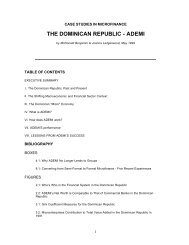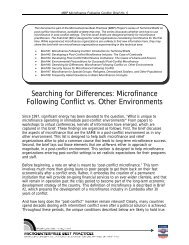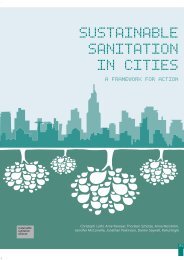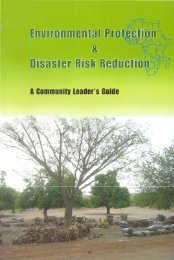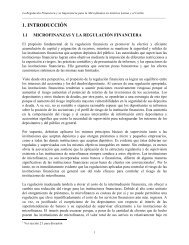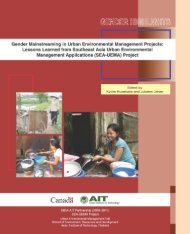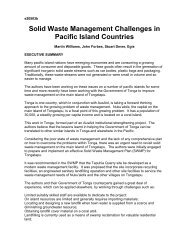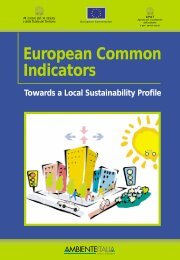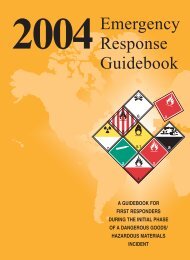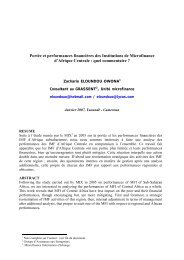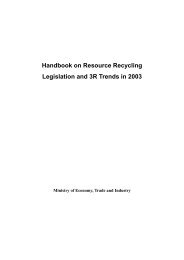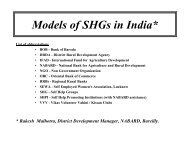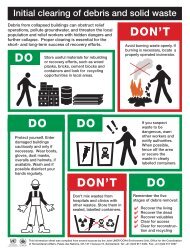The International Implementation Scheme (IIS) - Unesco
The International Implementation Scheme (IIS) - Unesco
The International Implementation Scheme (IIS) - Unesco
You also want an ePaper? Increase the reach of your titles
YUMPU automatically turns print PDFs into web optimized ePapers that Google loves.
DESD <strong>International</strong> <strong>Implementation</strong> <strong>Scheme</strong> (<strong>IIS</strong>)<br />
perform economic, financial and social functions. Such groupings are prime places for<br />
identifying and discussing issues of sustainable development and deciding how to implement<br />
more sustainable patterns of agricultural production and natural resource consumption in a rural<br />
African environment.<br />
Community-based organisations and local civil society: schools do not exist as islands in<br />
the community, but are often important places for broader dialogue and interaction, linking,<br />
through parental connections, with other community-based organisations and civil society<br />
groups. <strong>The</strong>se may be involved in a whole range of development-related activities, but without a<br />
conscious component of education for sustainable development. <strong>The</strong>se groups are important<br />
places for discovering what issues of sustainable development are relevant locally and so<br />
should be sensitised to using their knowledge to build public awareness, introduce local<br />
knowledge into the school setting and orient their own members to more sustainable practices.<br />
<strong>The</strong> workplace is another domain of learning with regard to sustainable development. Every<br />
workplace should consider how daily working practices and relationships are related to<br />
sustainable development and an explicit commitment to positive practices should be included in<br />
the procedures and manuals of the institution. <strong>The</strong>se alone will be insufficient unless<br />
accompanied by a consultative process – which is also a learning process – through which<br />
employees contribute to the development of such policies. In the case of extractive and energy<br />
industries and those engaged with other natural resources (water, agriculture, biodiversity),<br />
constant idea generation and innovation must be encouraged from the whole workforce, with<br />
each employee committed to demonstrating sustainable development principles such as gender<br />
equality and environmental protection inside and outside the workplace.<br />
In the formal education sector, the pressures of time, and other targets and initiatives, limit the<br />
take-up of ESD initiatives which are often seen as separate and additional to the standard<br />
curriculum. Education for sustainable development should not be seen as ‘one more subject’ to<br />
be added to an overcrowded curriculum but as a holistic or ‘whole school approach’ where<br />
sustainable development is seen as a context for delivering existing aims of education and not<br />
as a competing priority. Weaving ESD as a thread through the learner’s passage through the<br />
educational system – from pre-school to higher education institution – will maximise its impact.<br />
Schools and colleges are not only places of learning about sustainable development, but places<br />
where children can actively implement good practices of sustainable development, for example<br />
in energy conservation, recycling, productive use of school grounds or compound, use of natural<br />
materials and resources.<br />
Technical and vocational training institutes: much vocational training concerns the use and<br />
transformation of natural materials: rock into bricks and buildings, minerals into gates and<br />
fencing, fibres into clothing, and manufacturing processes. <strong>The</strong> DESD should work with<br />
vocational training institutes networks to establish a common framework for making sustainable<br />
development a foundational theme of such training.<br />
Teacher training institutions: teachers are often overloaded with the demands of changing<br />
and expanding curricula. Sustainable development must not be added as yet another subject or<br />
item on the timetable, but as an organising principle and cross-cutting theme. If sustainable<br />
development education is have a sustainable future, teachers must not only convinced of the<br />
need for ESD but also be equipped with strategies for integrating it into their classroom practice.<br />
<strong>The</strong> DESD should work with ministries of education to include sustainable development as a<br />
cross-cutting theme in teacher training institutions.<br />
Higher education has a particular role to play. Universities must function as places of research<br />
and learning for sustainable development, and as initiators and poles of activity in their<br />
communities and nationally. Educational theory and innovative practices frequently emerge from<br />
research programmes and academic investigation. Sustainable development needs to become<br />
a central preoccupation in determining areas of educational research and development. This<br />
24<br />
2005



